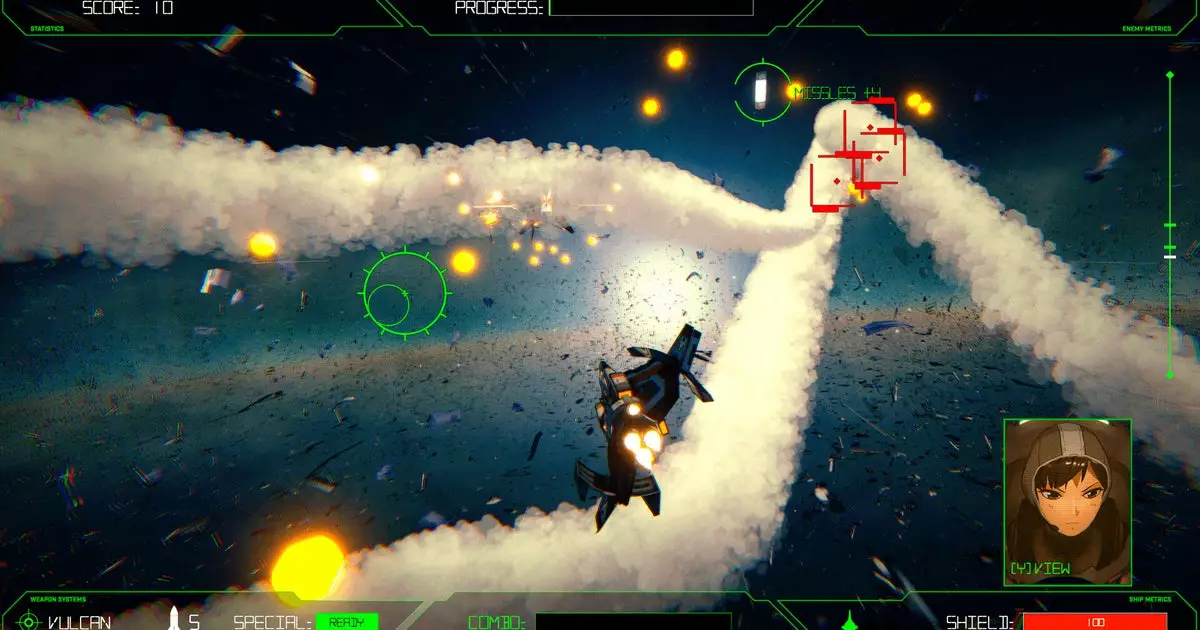Rogue Flight is being marketed as an exhilarating arcade space combat game that draws inspiration from the aesthetic and narrative depth of ’80s and ’90s anime classics. It promises to engage players with a unique blend of mechanics reminiscent of iconic titles like StarFox. Scheduled for release later this year, the game is generating buzz with its vibrant announcement trailer, which hints at the tantalizing gameplay experience awaiting players.
At its core, Rogue Flight is designed to allow players to perform daring aerial maneuvers while engaging in intense dogfights against various enemies across nine meticulously crafted stages. This thrust towards acrobatic gameplay is a standout feature, as it combines skillful navigation with the thrill of combat, promising a robust experience that challenges both reflexes and strategy. The introduction of a branching narrative adds an extra layer of immersion, allowing players to explore different paths and possibly outcomes, enhancing the game’s replayability.
Moreover, the addition of a roguelite mode—presumably with permadeath mechanics—adds an exciting dimension for those who thrive on high-stakes gameplay. This feature can significantly influence the player’s approach to challenges, making each session unpredictable and demanding strategic thinking. Customization options for both spacecraft and pilots foster a deeper connection between players and their in-game personas, reflecting personal play styles and preferences.
One intriguing aspect of Rogue Flight’s marketing strategy lies in its voice cast, featuring renowned Japanese actors celebrated for their roles in legendary series such as Sailor Moon and Neon Genesis Evangelion. For many fans of anime, these voices would evoke nostalgic sentiments and add authenticity to the experience. However, the game’s reliance on voice talent might be a risk for players who prefer English dubs, as they may feel disconnected from the original performances. While many gamers adore immersive storytelling, they often juggle multiple forms of media—like watching streamed games—making subtitles challenging to follow.
Conversely, the English voice cast includes actors familiar to the gaming community, notably from high-profile titles such as Fallout 76 and Overwatch. Despite this, the relevance of voice acting can vary among players, which raises questions about the overall importance of such marketing techniques. Different audiences have diverse priorities—some may prioritize visual aesthetics and gameplay mechanics over voice performances.
What truly captivates players, including those who may harbor mixed feelings about anime, is often the emotional resonance embedded within these narratives. The idea of navigating through the cosmos while piloting a formidable mech or spaceship echoes themes of introspection and the struggle against one’s demons. This exploration transforms personal melancholy into an adrenaline-fueled adventure. It reflects a longing many share: the desire to externalize internal conflicts through the thrills of gaming and mechanized combat, almost as an escape into a vibrant universe filled with dynamic storytelling and thrilling action. In contrast, while modern anime sometimes leans heavily on humor or fan service, titles that plunge into the depths of sorrow often resonate more profoundly, birthing connections between players and their in-game experiences.
Rogue Flight encapsulates the duality of gaming experiences, where frenetic combat meets poignant storytelling, urging players to confront their emotional landscapes while embarking on an epic space adventure. As the release draws near, anticipation builds around how these elements will intertwine in an engaging, interactive format that sparks both challenge and introspection.

